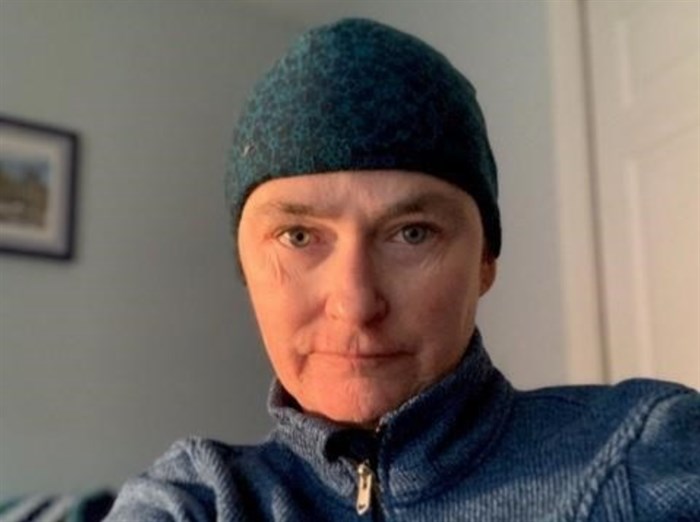
Robin McGee of Port Williams, N.S., is shown in this undated handout photo.
Image Credit: THE CANADIAN PRESS/HO - Robin McGee
November 20, 2020 - 5:30 AM
Robin McGee learned in mid-March that the colorectal cancer she started battling a decade earlier had returned for the third time, just as surgeries were being cancelled due to the COVID-19 pandemic.
McGee, of Port Williams, N.S., would normally have waited about a month to begin chemotherapy, but said she didn't start treatment for three months, and didn't speak to a surgeon for almost four and a half months.
"So it's a situation in which I had a diagnosis of a Stage 4 recurrence and I went for months with no guidance," she said.
McGee was one of many Canadians to have had treatment or surgeries delayed as the pandemic hit and hospitals braced for the flood of patients they expected after seeing images of overrun health-care facilities in Wuhan, China and Italy.
Data from the Canadian Institute for Health Information shows nearly half of all surgeries were cancelled across the country during the first four months of the COVID-19 pandemic, compared with the same period last year.
Figures released Thursday show the biggest dip in surgeries between March and June came in April, when 72 per cent of procedures were postponed before provinces and territories started ramping them up to varying degrees.
While a slowdown in elective surgeries was expected, the first wave of the pandemic also meant an estimated 20 per cent fewer life-saving and urgent cancer and cardiac surgeries were performed as jurisdictions scrambled to meet the needs of high-priority patients.
Data from the federal agency is aimed at helping provinces and territories model surgical needs during the second wave of the pandemic.
McGee, 59, was in remission for seven years after her first diagnosis of colorectal cancer in 2010, but the disease recurred in 2018. When it struck again earlier this year, she also needed cataract surgery as a result of previous treatments.
That operation, originally scheduled for March, was cancelled. But McGee received a special exemption from the province to have the surgery in April through a private clinic while she waited for chemotherapy.
The cancellations and delays took an emotional toll on her.
"That's the closest I've ever come in my 10 years (of battling cancer) to going under emotionally," she said.
Stuart Peacock, a professor in the faculty of health sciences at Simon Fraser University in Buranby, B.C., and co-director of the Canadian Centre for Applied Research in Cancer Control, said health-care providers are learning important lessons about the mental health impact of cancelled surgeries, early detection and screening on patients and their families.
"We need to think more carefully about the trade-offs between curtailing some operations and containing the virus at the same time," he said. "COVID has taught us that we need to have answers more quickly than we can currently generate them."
Some patients postponed screening appointments themselves out of fear of entering health-care spaces during the pandemic, Peacock said.
Peacock said he is participating in a study on the unintendended consequences of the health-care response during the pandemic as part of a global effort by the Switzerland-based Union for International Cancer Control, a non-governmental group with over 1,200 organizations in about 170 countries.
Dr. Craig Earle, an oncologist at Sunnybrook Hospital in Toronto, said provinces and territories have learned that fewer cancellations may be the way forward in the second wave of the pandemic, in order to launch a stronger recovery of the health-care system in the months and years ahead.
The partnership and the Canadian Association of Provincial Cancer Agencies has co-ordinated a consortium across the country to share modelling data on practical ways to clear the backlog for cancer patients, said Earle, who is also vice-president of cancer control at the Canadian Partnership Against Cancer.
"We're looking at things like opening on evenings, or if we're open six days a week, seven days a week. What if we prioritize or if we don't prioritize and just go on a first-come-first-served basis?"
The data from the Canadian Institute for Health Information also showed that virtual visits rose by 55 per cent across the country starting in April, though there's no measurement of the quality of those interactions.
Earle said experience from the past few months has revealed that virtual appointments, which might mean just a phone call, are not suitable in some situations, including when patients would first learn they have cancer. He is now doing most of those visits in person.
This report by The Canadian Press was first published Nov. 19, 2020.
News from © The Canadian Press, 2020